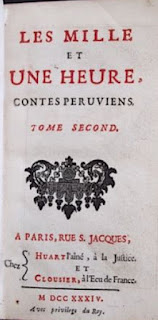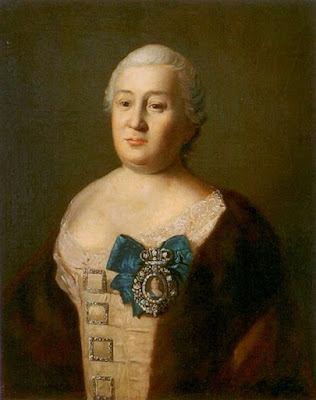001. Marusja Čuraj / Маруся Чурай
According to Prince N. N. Golicyn (272-73), the first Russian woman writer was Marusja Čuraj.[1] Marusja, whose creative talents flourished in the midst of 17th-century struggles for independence, has since become a Ukrainian folk heroine; in 2000, she was featured on a Ukrainian postage stamp:[2]
In Golicyn's synopsis, Mar'ja Gordeevna "Marusja" Čuraj was born in Poltava in 1628 and died at some point after 1648. She was "the daughter of a Cossack officer of the Poltava regiment, who was burnt at the stake in Warsaw" and though sentenced to death herself in 1648, she was subsequently pardoned, the story goes, "for the sake of her sweet songs". In short, Marusja was an "improvisor of Ukrainian songs and one of the best singers in Ukraine at that time". Golicyn goes on to list the titles of six of her songs, some of which are in Ukrainian and some in Russian.
Golicyn's sources are three: (1) "Marusja Čuraj, Malorussian [Ukrainian] Songstress (A Detailed Biography with Excerpts from Her Songs)" by V. Škljarevskij in the journal Pčela (1877); (2) a story entitled "Marusja, the Sappho of Malorossija" by writer (and prince) A. A. Šachovskoj; and (3) commentary by the literary critic V. G. Belinskij (in a then available edition of his Sočinenija, vol. 3, 61-62).
The inclusion of Marusja in a list of Russian women writers is problematic for multiple reasons, ranging from the geographical, ethnographic, and political to the literary. Can we legitimately claim the Ukrainian Marusja as a "Russian" writer? To what extent might she herself -- 240 years before Golicyn and 370 years before today -- have perceived the significance of her own Ukrainian (and Cossack) identity to contrast or overlap with Russianness?
Let us recall that in Marusja's day, Poltava was not yet part of the Russian Empire, but belonged to the Polish-Lithuanian Commonwealth and the fight for liberation in which she was involved was directed largely against that entity. At the same time, it is clear that Golicyn -- probably together with Škljarevskij, Šachovskoj, and Belinskij -- was not keenly attuned to the idea of a Ukrainian independence or identity that could be meaningfully distinguished from Russia and Russianness. Indeed, the romantic figure of a young Cossack girl caught in the middle of a patriotic struggle captured the imagination of both Ukrainians and Russians in the mid-nineteenth century. In the 1830s, Marusja became the subject of a Ukrainian tale by H. F. Kvitka-Osnovjanenko (1834) and a Russian one by Šachovskoj (1839). The illustration above, by Ja. A. Sapožnikov, accompanies Šachovskoj's story, which appeared in the volume One Hundred Russian Writers (Sto russkich literatorov, v. 1, 1839, 769-71).
Another problem is whether or not Marusja was a writer at all (when does a "singer" become a "writer"?). Do we really know that the excerpts credited to her by Škljarevskij or others were truly composed by her? Did Marusja actually write down her songs? It is hard to imagine that she would have been literate. Perhaps someone else transcribed them? (Can you be a "writer" if your compositions are put on paper by others?) And what was Marusja's language of choice? Was she in fact bilingual? The fact that Golicyn reports some of her song titles as Russian does not necessarily mean this was the language in which she originally composed her songs.
In short, if what we are dealing with here is a Ukrainian woman who lived in Ukrainian territory and sang in the Ukrainian language, it is difficult to claim in 2015 that she belongs in a list of Russian women writers. On the other hand, if she actually wrote down her songs and also wrote some of them in Russian, perhaps we can. In either case, the half-legendary figure of Marusja is certainly relevant to Russian cultural history.
The topic of Marusja awaits your input, students.
On Marusja see also this post.
NOTES:
[1] On Golicyn's text and on The Golicyn History thread found on this blog, see the previous post.
[2] The postage stamp is from the Russian Wikipedia entry on Marusja.
[2] The postage stamp is from the Russian Wikipedia entry on Marusja.
FURTHER READING:
Belinskij, V. G. The commentary to which Golicyn refers can be found in Belinskij's review of Sovremennik, t. 11 (1838), in vol. 2 of Sobranie sočinenij v 9-ti tomach (M.: Chud. lit., 1977).
"Čuraj, Marusja (Mar’ja) Gordeevna," Encyklopedičeskij slovar’ Brokgauza i Efrona, vol. II (doponitel'nyj) (1907), 875.
"Čuraj, Marusja (Mar’ja) Gordeevna," Encyklopedičeskij slovar’ Brokgauza i Efrona, vol. II (doponitel'nyj) (1907), 875.
Garskij, V. "Marusja (Mar’ja) Gordeevna Čuraj," Russkij biografičeskij slovar', vol. 22 (1905), 460.
Škljarevskij, V. "Marusja Čuraj, malorossijskaja pevun'ja," Pčela (1877), n. 45, 711-12.





Comments
Post a Comment